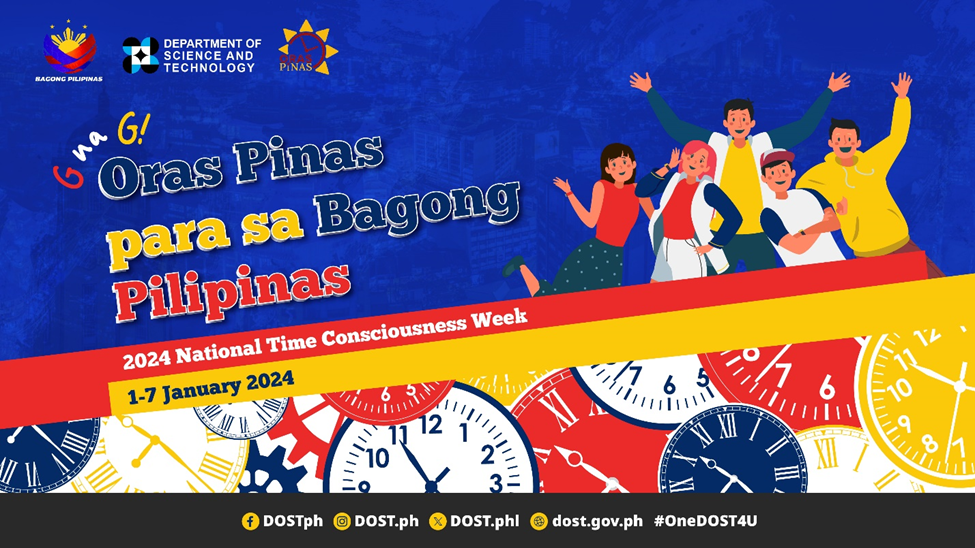By Allan Mauro V. Marfal
In an era marked by incessant distractions, the art of respecting and valuing one another’s time often takes a back seat, which may cause, in some instances, inconvenience to both parties. The pressing demands of modern life, coupled with a myriad of diversions, contribute to the oversight of responsible time management. The consequence, however, extends beyond the individual level, impacting relationships with family, friends, partners, and coworkers in ways often underestimated.
Recognizing the critical need for a cultural shift towards time consciousness, the Department of Science and Technology (DOST) is set to take the lead, once more, in promoting the National Time Consciousness Week (NTCW) in 2024. From January 1 to 7, under the resonating theme “G na G! Oras Pinas para sa Bagong Pilipinas,” the DOST aims to synchronize all timepieces across the nation, creating a unified commitment to punctuality and respect for each other’s time.
As the New Year unfolds, the DOST emphasizes the significance of instilling a habit of punctuality in the minds of every Filipino. Beyond the mere ticking of the clock, the department envisions a broader impact on the fabric of society, recognizing that the habit of being on time is a cornerstone in all aspects of businesses and activities.
The theme for 2024 speaks directly to the heart of the matter, urging Filipinos to embrace a culture where time is regarded with utmost importance. “G na G! Oras Pinas para sa Bagong Pilipinas” encapsulates the spirit of enthusiasm, vibrancy, and commitment towards a new and punctual nation towards a progressive society.
At its core, this year’s NTCW theme is designed to focus on the younger generation. The DOST aims to impart the value of punctuality to the youth, emphasizing the profound impact of time management on their future success. By cultivating an understanding of the essence of time, early on, the department believes that young Filipinos can harness this knowledge as a powerful tool in shaping their personal and professional trajectories.
The Philippine Standard Time (PhST) Act of 2013.
This advocacy aims to promote the new Pilipino time which is under Republic Act No. 10535 or The Philippine Standard Time (PhST) Act of 2013.
The law requires all national and local government agencies as well as broadcasting companies to adhere to and display the PhST in their respective offices. This makes these entities not only united but also in sync with each other, a perfect gesture of synergy needed to efficiently run a bureaucracy.
The DOST-Philippine Atmospheric, Geophysical, and Astronomical Services Administration (PAGASA) is tasked to be the official timekeeper.
However, it was started in 2011 as an advocacy campaign which was called as “Juan Time”, a play of words on “One Time” (single or unified time) and “Juan” being the common name for Filipinos.
Thereafter, the main campaign was rebranded two years ago into “Oras Pinas” which hopes to institutionalize the new Filipino culture of being always on time and having only one time as a nation.
The GPS and the atomic clock
The PhST must be kept according to the Coordinated Universal Time (UCT)—the world’s official time. How does this office ensure that we get the correct time all the time? Since 2003, DOST-PAGASA has been using a very accurate clock, specifically a rubidium atomic clock for timekeeping. The rubidium clock is one of the two most widely used atomic clocks in the world (the other one being the more accurate cesium clock).
The rubidium clock in the DOST-PAGASA station is equipped with a receiver that receives timing signals from at least four orbiting satellites in the Global Positioning System (GPS) within its range. These satellites are each equipped with up to four atomic clocks which are periodically updated from a cesium atomic clock based in Boulder, Colorado.
This system keeps the DOST-PAGASA clock synchronized to the UTC. GPS is the same technology being used for modern navigation consisting of 24 satellites that broadcast their location, status, and precise time. Precise time is necessary for the GPS to work, as this will be used to compute the exact location of a receiver using geometry principles. (PR)
To sync your timepieces, just visit the DOST-PAGASA website (http://bagong.pagasa.dost.gov.ph/) and get the official Oras Pinas.

